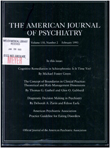Benzodiazepines in the treatment of schizophrenia: a review and reappraisal
Abstract
OBJECTIVE: Benzodiazepines, either alone or added to neuroleptics, have been studied extensively as treatments for schizophrenia, but no consensus regarding their efficacy has been reached. The authors review the double-blind trials in the literature and relate the findings to the neurobiology of benzodiazepine actions. METHOD: The clinical review included all double-blind studies through 1989 that could be identified by means of Index Medicus and computer-assisted searches and by the cross-referencing of articles. The findings from the 14 studies of benzodiazepines used alone and the 16 studies of adjunctive therapy are presented separately. RESULTS: The studies reviewed suggest that 1) response is highly variable, and about one-third to one-half of patients improve; 2) benzodiazepines are potentially most useful as adjuncts to neuroleptics in the acute management of psychotic agitation, although actual antipsychotic effects have also been observed in some patients; 3) relatively higher doses of benzodiazepines may be associated with better response; and 4) therapeutic effects, when seen, develop rapidly but diminish after several weeks in some patients. The authors explore the neurobiological bases of benzodiazepine action, which presumably underlie their efficacy in schizophrenia and may help explain the variability of response. CONCLUSIONS: Future research on benzodiazepines in the treatment of schizophrenia should focus on features that predict response, the relation of dopamine or other neurotransmitter systems to therapeutic effects, the schizophrenic symptoms most amenable to benzodiazepine treatment, changes in neuroleptic dose during benzodiazepine augmentation, the role of benzodiazepines in maintenance therapy, and the optimal characteristics of benzodiazepine treatment.
Access content
To read the fulltext, please use one of the options below to sign in or purchase access.- Personal login
- Institutional Login
- Sign in via OpenAthens
- Register for access
-
Please login/register if you wish to pair your device and check access availability.
Not a subscriber?
PsychiatryOnline subscription options offer access to the DSM-5 library, books, journals, CME, and patient resources. This all-in-one virtual library provides psychiatrists and mental health professionals with key resources for diagnosis, treatment, research, and professional development.
Need more help? PsychiatryOnline Customer Service may be reached by emailing [email protected] or by calling 800-368-5777 (in the U.S.) or 703-907-7322 (outside the U.S.).



